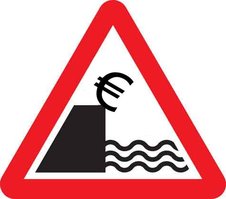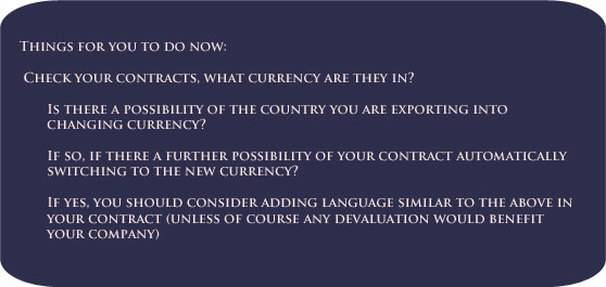|
Here we have another article on contract clauses from one of our freelancer lawyers and it is a fairly hot topic, given the potential outcome in the upcoming election in France. Specifically, this article contains a draft example clause to deal with a country leaving the Euro for you to include in your contracts. As always, it is worth restating that HPLpro is not a legal firm, and this article should not be taken as legal advice. It is important for you and your business to have experienced legal practitioners review your specific situation in relation to this article. Please feel free to request a freelance in-house lawyer from us if required. Do you, or your business, have a lot of work on the continent, specifically in Euro based countries? If so, it may be prudent for you to include language within your contracts that will address the possibility of one of the countries that you do business in dropping out of the Euro currency (either wilfully or otherwise). The legal principle to be aware of in this area is known as lex monetae – apologies for the Latin - which holds that a state chooses its own currency and, upon a country leaving a currency, contracts relating to that nation could potentially default to the new currency in that nation – this is known as redenomination risk and it is problematic due to the possibility for a catastrophic devaluation of the new currency. For example, if, following the French election, France did decide to leave the Euro and re-establish the Franc, that currency could devalue (along with the Euro) – if you are doing business in that country and your contract was based in Euros, you could suddenly find yourself being paid in a horribly devalued currency – the new Franc. One minute you are paid €100 (worth eg £100) the next minute you are paid 100NFF (New French Francs) (worth eg £1). It is, of course, possible that the new currency would gain value, but it is specifically the uncertainty for the business that is the concern here. It is further possible that such a devaluation would favour your company so you do need to consider your specific situation carefully. Ultimately, you should include wording in your contracts which attempts to give an element of consistency and certainty. The below draft wording could be a good starting place but, as with all things legal, you must engage legal advice for your specific circumstances. Additionally, be aware that even if you include such language in your contracts, legislation could act to override contractual clauses. The words in square brackets are for your lawyer to amend depending upon your situation. The first clause deals with a country exiting the Euro, the second clause deals with the Euro zone ceasing to exist (in which case the contract defaults to USD with the parties then having an opportunity to agree a suitable currency). a) Subject to sub-clause b), In the event that the Euro (for the purposes of this Agreement, Euro is defined as the official single currency of European Member States as at 1st January 2012) ceases to be the legal currency in [INSERT TERRITORY]: ("The Territory") the relevant currency for the Agreement will [remain the Euro/ revert to Sterling/ revert to USD] ; any reference to Euros in the Agreement will be read as references to [Euros/Pounds Sterling/USD] ; the prices hereunder will thereafter be calculated in [Euros/Pounds Sterling/USD] and, as at the date of the relevant invoice, converted into the new local currency of the Territory; any invoices or credit notes sent by either party thereafter will refer to [Euros/Pounds Sterling/USD]; this Agreement will thereafter be governed by the laws of [England and Wales]; such an event will, for the purposes of this Agreement, not be deemed an event of force majeure or outside of the reasonable control of either party hereto and the parties will take all such necessary steps to ensure that this clause is enforced and [NAME OF THE OTHER COMPANY] will be responsible, fully liable for, and will indemnify [NAME OF YOUR COMPANY] against, the effects of any legislation in the Territory which requires that all contracts formed with a counterparty in the Territory or being part-performed in the Territory be changed to a currency other than [Euros/Pounds Sterling/USD]. b) On the date that the Euro ceases to be legal tender in the majority of the Euro zone countries that were Euro zone countries as of January 1st 2012 (the “Exit Event”), all monetary sums expressed in Euros in this Agreement shall be converted into [US dollar] sums (calculated using the final exchange rate between US dollars and the Euro as published by the Bank of England). After the expiry of a six-month period following the Exit Event the parties will meet to discuss in good faith the appropriate currency for the Agreement. For the avoidance of doubt, the Exit Event will not be an event of force majeure. Again, the point of the clauses is to attempt to bring some certainty to what will be an uncertain situation at the time. We will follow this article up with one relating to Brexit and its impact on contracts shortly. Hope the above is helpful. The HPLpro Team
Comments
In the next of our series of explanatory articles on commercial legal issues, we asked one of the freelancers who works with us to put some thought into explaining Force Majeure. As always, it is worth restating that HPLpro is not a legal firm, and this article should not be taken as legal advice. It is important for you and your business to have experienced legal practitioners review any legal issues or documents to ensure that they adequately meet your needs. Please feel free to request a freelance in-house lawyer from us if required.
|
AuthorHPLpro Archives
June 2017
Categories
All
|









 RSS Feed
RSS Feed